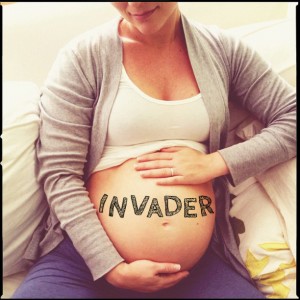I frequently see pictures like this floating around Facebook and Twitter. They’re part of what I like to call the “um, actually” genre of Internet debate which depends on a single, often pretentious rebuttal to an unsophisticated meme, passed around triumphantly without giving the meme’s creator a chance to respond in kind. As political discourse, they’re a rung or two below those times John Oliver “destroyed” Donald Drumpf. Their purpose is not to inform or make converts, but to reinforce existing beliefs.
 As popular as “um, actually” posts are, especially when it comes to the abortion debate, they’re not all that difficult to answer. What’s difficult is giving your answer the kind of legs the post, itself, has–especially once it’s screencapped below the original meme and circled in red. They’re the modern equivalent of traveling Saint George and the Dragon plays where the paper-decked monster is ritualistically vanquished by the hero before packing up and moving to the next village.
As popular as “um, actually” posts are, especially when it comes to the abortion debate, they’re not all that difficult to answer. What’s difficult is giving your answer the kind of legs the post, itself, has–especially once it’s screencapped below the original meme and circled in red. They’re the modern equivalent of traveling Saint George and the Dragon plays where the paper-decked monster is ritualistically vanquished by the hero before packing up and moving to the next village.
What we have in this one is essentially the famous violinist scenario (you wake up hooked to a concert violinist against your will, and must decide whether to stay with him for nine months or unplug yourself and let him die). But the comparison of motherhood with a scenario in which your bodily fluids are used against your will suffers from major problems. There are three ways this stage-play dragon is unlike pregnancy.
First, it assumes that the mother had no choice in becoming pregnant. False. In all cases except rape, she absolutely chose to have sex, which is how babies are made. Her bodily autonomy should have been exercised then, not after the baby was conceived. Nothing strange has befallen her. Sex worked!
Second, it equates a mother’s unborn child with a complete stranger whom she has been forced to unnaturally sustain with her body. But the mother-child relationship is deeply natural. It is virtually the only universal human relationship. And the baby in the womb is not an invader. It is literally an extension of the mother’s biological being, and is exactly where it belongs.
Third, this argument assumes that abortion is the equivalent of refusing to provide an organ to someone in need. In that scenario, you merely elect to keep your own body intact. You do not exert any violence against the person in need of an organ. This is not true of abortion, which involves much more than “eviction.” It is a violent procedure whereby an unborn baby is poisoned, crushed, burned, or ripped into pieces before being removed from the womb. Even if you have a right to evict someone (which a pregnant mother does not have) you have no right to commit violence against them. It’s the difference between a positive and negative act.
We could add a fourth point: Everyone, even radical pro-choicers, believes that parents have obligations to their children, and that they do not have total bodily autonomy. The very concept of parenthood assumes that children have a claim on your body, your time, and your resources. A mother has an obligation to feed her newborn child, if not with her body, then with a substitute. If she exercises her “bodily autonomy” and refuses the child food, she will go to jail. Total bodily autonomy is itself an unworkable concept. I do not have total bodily autonomy to perform excretory functions wherever I please. I do not have the autonomy to trespass, or even swing my fist wherever I please. Everywhere I go, the rights of others restrict how I can exercise my bodily autonomy. The idea that no one can ever make demands of us is idiotic.
I think anyone in their right mind would agree that someone who had nothing to do with a near-fatal accident which left a patient in need of a blood transfusion is not in the same position as a woman who took action designed to bring a child into existence, and now wants to hire someone to vacuum that child’s brains out. The two scenarios are vastly different, no matter how you slice it. Therefore, the analogy fails.
In the case of pregnancy resulting from rape (which is comparatively rare, and accounts for just one percent of all abortions) we need to exercise care, because the woman did not, in fact, choose to have sex or become pregnant. Someone committed a heinous crime and forced it on her. Nevertheless, I think we can argue from the natural connection of mother and child and the fact that more violence against an innocent party will be involved in terminating the pregnancy that the child’s right to live outweighs the mother’s claim on nine months of her life. But let’s go further, still.
If we accept the total bodily autonomy argument for children conceived in rape, it also proves too much. It means a mother should be able to kill or at least starve a newborn or toddler conceived in rape, because it reminds her of the crime. But no one but the most loony fringe ethicists at Princeton would argue this. Even the wackiest of the wacky probably believe that a mother of a one-year-old child conceived in rape must at the very least take the time to turn custody over to a new caretaker. But that small amount of time shows that they do accept a demand on the mother’s bodily autonomy, however brief. She cannot simply kill the child or leave him by the side of the road. Why? Because that child conceived in rape is nevertheless a child, who is naturally (as opposed to artificially) dependent on her care for life. But if fetuses in the womb are also children, then their origins do not abrogate their rights. Killing them or evicting them suddenly knowing they will die is equally wrong.
Pregnancy is just like forcing someone to give blood for nine months against their will? Um, actually, no.
















